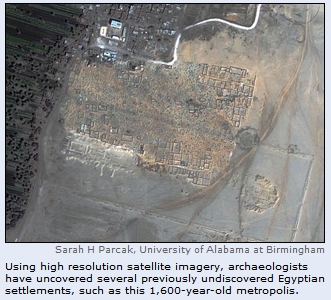You wouldn’t think that there would be much left to discover of Ancient Egypt. But, you’d be wrong. New discoveries are added every year. And old theories often have to be revised – or even abandoned.
 Egyptian civilization flourished from about 2500BC until about the time of the close of the Old Testament in 500BC. It was overrun by the Assyrians about 600BC, Alexander the Great in about 300BC and finally the Romans in about 40BC.
Egyptian civilization flourished from about 2500BC until about the time of the close of the Old Testament in 500BC. It was overrun by the Assyrians about 600BC, Alexander the Great in about 300BC and finally the Romans in about 40BC.
When the Arabs displaced the Romans in about 600AD, Egyptian culture disappeared from the radar of western civilization.
The language of the Ancient Egyptians was completely lost and many of the cities of the Nile valley were abandoned and then covered by drifting sands.
Today, I noticed the story associated with the picture above. My point in linking to it is to remind everyone that what we know of ancient Egypt is, in many respects still incomplete and based on conjecture. Hieroglyphs were deciphered only about 170 years ago. Many of the archives are still being recovered, transcribed, and translated. There are clearly still lots of sites unexplored.
In particular, the chronology of Ancient Egypt is still very much a speculative exercise. The evidence that establishes firm dates in the history of Israel is much more complete than it is for Egypt.
Those who subscribe to a biblical world-view need not be threatened by new discoveries from Ancient Egypt. Indeed, we should be excited. Its likely, indeed probable, that evidence of the Patriarchs and the sojourn of Israel in Egypt is still there – waiting to be discovered. There have been tantalizing hints over the past 40 years. Who knows what the next 40 might bring?
You might start with this wikipedia article, if you’re interested in Egyptian chronology.
Here’s another interesting article, with the provocative title, Unsolved Problems in Egyptology. Students of history should know that there are lots of opportunities out there for anyone interested in pursuing a career.
For those who really want to delve into this, I highly recommend the research of Egyptologist David Rohl. A pretty good place to start on Rohl and his new chronology, would be this article. Be forewarned, Rohl is a maverick, and controversial.
While one must always be cautious in reading a wikipedia article, they are often a valuable overview of a topic and provide both links to further information and often some assesment of the pros and cons associated with any controversial issue.
-Rob Shearer
Director, Schaeffer Study Center
Ah, Rob! Here I am, supposedly just taking a look at your site, and I find that you have all this fascinating stuff about Ancient Egypt that is guaranteed to lead me down rabbit trails.
I decided years ago that in a different life I would surely have been an archeologist instead of an author, editor, and publisher.
I’m enjoying the blog, and glad to see you on the ‘net. Welcome to the party!
Celebrating Jesus!
Tammy C